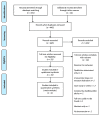Interventions to Improve Hydration in Older Adults: A Systematic Review and Meta-Analysis
- PMID: 34684642
- PMCID: PMC8537864
- DOI: 10.3390/nu13103640
Interventions to Improve Hydration in Older Adults: A Systematic Review and Meta-Analysis
Abstract
Dehydration is common in the elderly, especially when hospitalised. This study investigated the impact of interventions to improve hydration in acutely unwell or institutionalised older adults for hydration and hydration linked events (constipation, falls, urinary tract infections) as well as patient satisfaction. Four databases were searched from inception to 13 May 2020 for studies of interventions to improve hydration. Nineteen studies (978 participants) were included and two studies (165 participants) were meta-analysed. Behavioural interventions were associated with a significant improvement in hydration. Environmental, multifaceted and nutritional interventions had mixed success. Meta-analysis indicated that groups receiving interventions to improve hydration consumed 300.93 mL more fluid per day than those in the usual care groups (95% CI: 289.27 mL, 312.59 mL; I2 = 0%, p < 0.00001). Overall, there is limited evidence describing interventions to improve hydration in acutely unwell or institutionalised older adults. Behavioural interventions appear promising. High-quality studies using validated rather than subjective methods of assessing hydration are needed to determine effective interventions.
Keywords: beverages; dehydration; elderly; fluid; geriatric; inpatient; institutionalized; meta-analysis; systematic review.
Conflict of interest statement
The authors declare no conflict of interest.
Figures
References
-
- Begum M.N., Johnson C.S. A review of the literature on dehydration in the institutionalized elderly. e-SPEN Eur. E-J. Clin. Nutr. Metab. 2010;5:e47–e53. doi: 10.1016/j.eclnm.2009.10.007. - DOI
-
- Johnson L., Holyday M. How Do We Stop Starving and Dehydrating Our Patients on Dysphagia Diets? Nutr. Diet. 2017;74:64.
Publication types
MeSH terms
LinkOut - more resources
Full Text Sources
Medical



